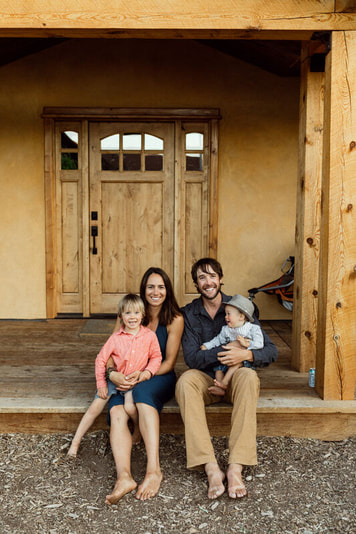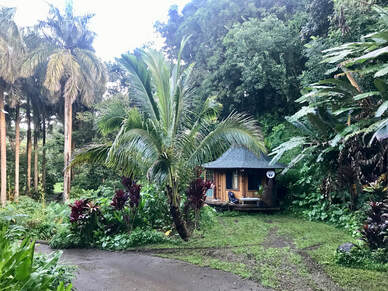
The McCann family at their home in Moab, UT. Credit – Emily Klarer
Reclaimed Hope
On a cold December morning in 2018, our family departed for Maui, HI. High above the Pacific Ocean, I said to my husband, “if no one picks us up at the airport and the site is failing, I give up.” I was teetering on a loss of hope and enthusiasm for humanity and sustainability. Our family lives in a 100% electric, passive solar, solar PV-powered, bamboo and earthen plastered, straw bale, consciously built home in a walking/biking only community in Moab, UT. I bike to work most days. My job entails helping others lighten their environmental footprint. And yet, this feeling of being a parasite on our planet was gnawing away at me. Despite how consciously we built our home, a few truckloads of construction waste made their way to the landfill. Despite biking most days, I also drive a fossil-fuel powered vehicle. Despite my best efforts to reduce my waste, I’m overwhelmed with plastic packaging. But it’s recyclable! And a lot is thrown out or flies away for wildlife to become entangled in. A student wrote in my course evaluation that fall, that I needed to be more optimistic. Reading that was a shock as I had prided myself in being an eternal optimist. My eyes welled both as I looked at my toddling son, awestruck and staring out the window at our beautiful planet below, and as I felt a young baby forming in my body, and I wondered for the thousandth time how I could bring a human into this mess, let alone two. I was at a breaking point.
What I did not consciously know, is that I designed a six-month journey of hope for myself and my family, which we were just beginning that December. Almost a month in Maui would follow with half a year of traveling around the U.S. in an 18-foot camper trailer, interviewing inspirational leaders in ecological design along the way.

Bamboo hut at the Haiku Aina Permaculture Initiative in Maui
We were greeted at the airport and taken to our first site – the Haiku Aina Permaculture Initiative – a diversified food forest and teaching center in Haiku, Maui. We descended a steep hillside past giant avocado, mango, and lemon trees, and stepped out at our one-bedroom bamboo hut that would be our home for the next several weeks. Without cellular service and suddenly with time to reflect and look introspectively, I was in a ripe location to begin my journey of hope. The need for this became apparent when, at a remote area called the “Birthing Pools” near one of the largest surf breaks in the world, the ocean nearly took my life, my identification, and killed my phone. I was baptized by mother nature, dependent on my fellow parasitic humans for help, and for the first time in a very long time, witnessed the beauty in humans and their ability to live mutualistically, if not regeneratively, with our planet.
I interviewed 24 people in 2019, asking what permaculture means, where the movement is headed, hard questions regarding diversity and equity, and more. The beginning of our travels involved a focus on the diverse sites we would visit and places we’d see along the way. Remarkably, however, I began to feel a higher level of excitement in hearing people’s life stories resulting in the physical regenerative work they were engaged in. I found common themes, including fighting in the front lines of environmental activism and turning to the solutions-based framework of permaculture as a refuge, enacting systems-level solutions beyond the home landscape, shortcomings of our siloed academic system, and an overall awareness of humans’ ability to enact positive change. Now as I work through the coding process of the recorded interviews, my hope is strengthened with each beautiful story.
I delivered my baby the same month we returned home to Moab, in temperatures soaring above 100 degrees. His giggles as he plays with his older brother make my heart explode with joy all over again. I still dabble in despair, especially with the visual association of our parasitic nature with masks everywhere under the pandemic. But the stories I recorded along the way provided an anchor of hope that was absent as we flew to Maui that cold December morning. Hindsight is 2020 and this pivotal year of the great pause is an immense opportunity for all of us to rebuild with hope. We belong, can life each other up, and we have it within us to enact regenerative change. Now let’s get to work.
To discover more about the work we are doing, visit our website at http://permaculture.usu.edu
Recent Posts

